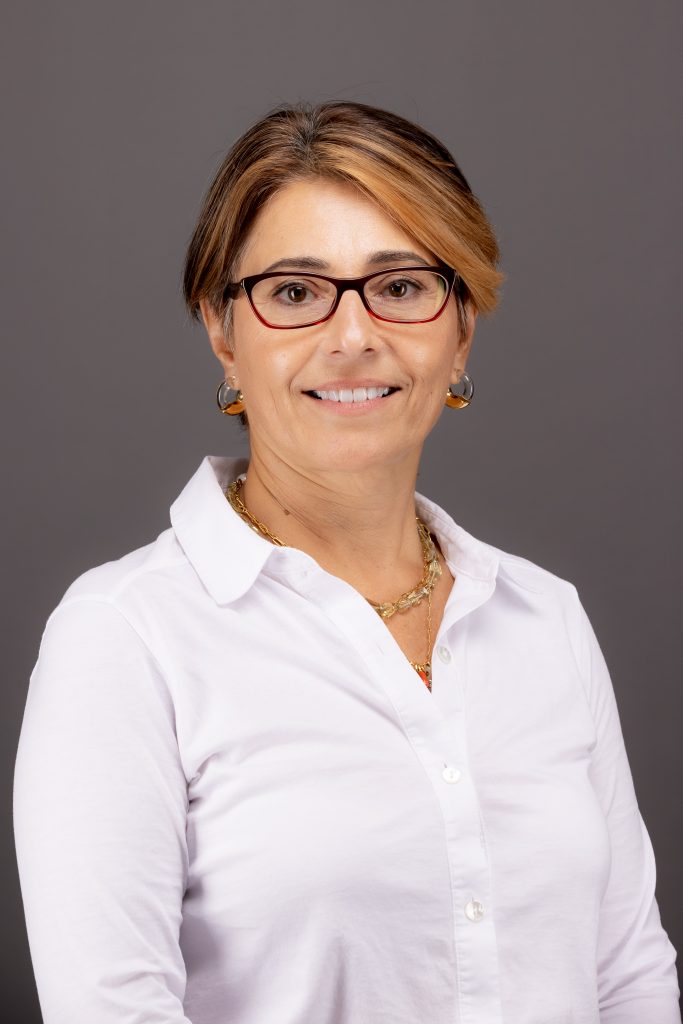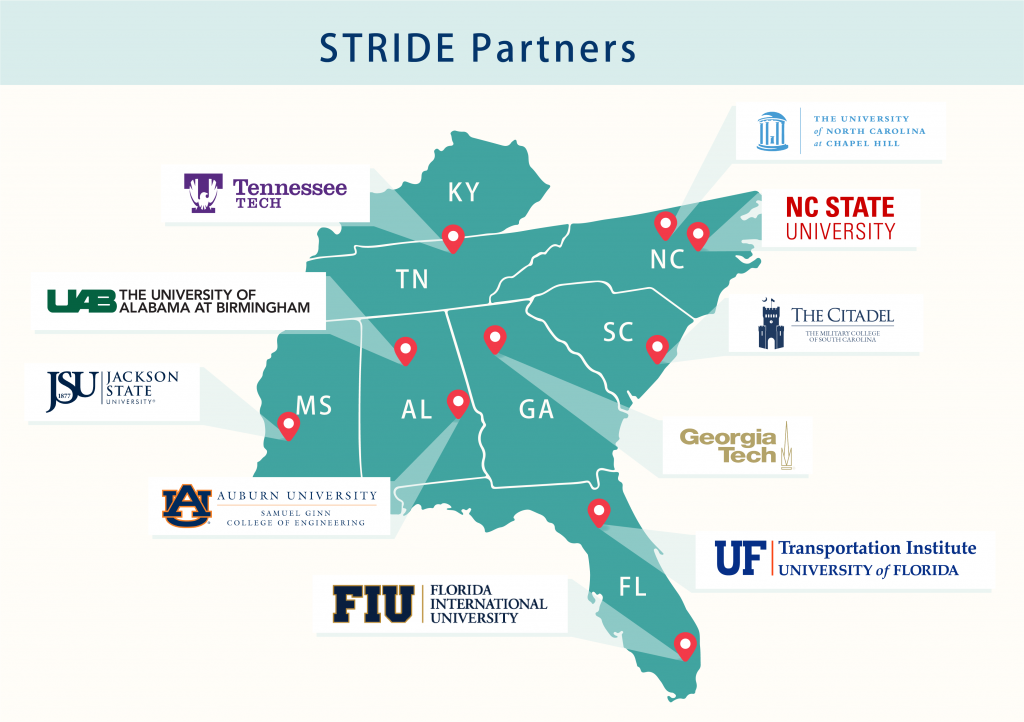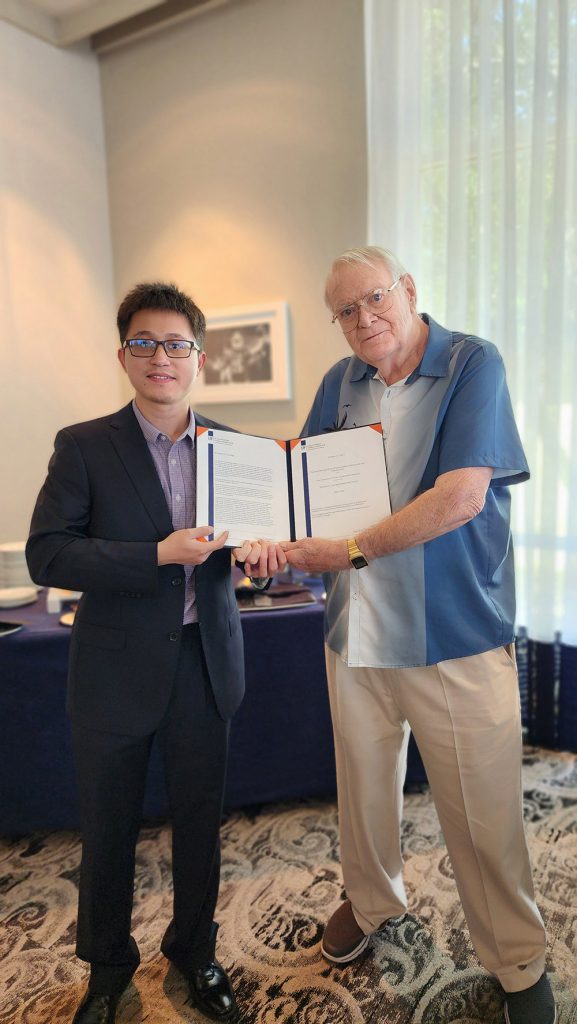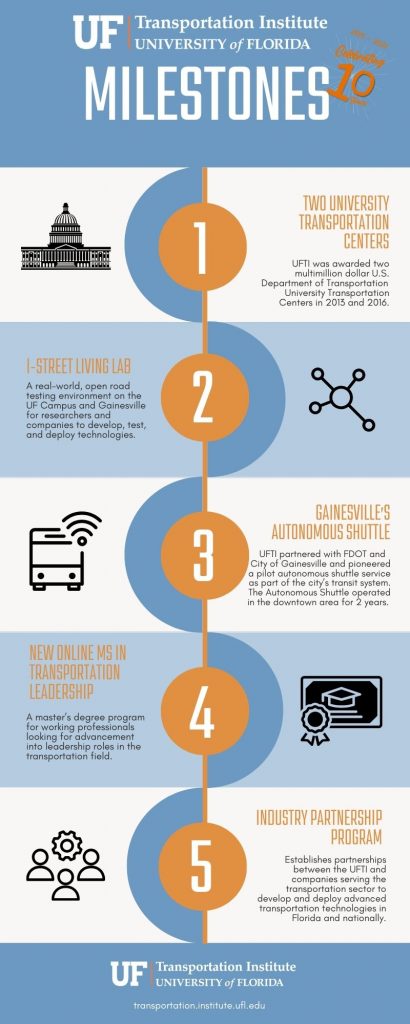By Ines Aviles-Spadoni, M.S.
The University of Florida Transportation Institute (UFTI) this year is commemorating 10 years of ground-breaking research and contributions to the transportation sector.
The UFTI was founded in 2013. It is now regarded as a leader in transportation research and education. The Institute has served as a hub for multidisciplinary transportation research, providing practitioners with cutting-edge tools for decision-making and analysis. It is also the top choice for students for transportation education.
A variety of leading-edge research initiatives have been created under the leadership of Dr. Lily Elefteriadou, professor and director of the UFTI. The most significant among these initiatives is the creation of the I-STREET Living Lab, which received official recognition from the state of Florida in Spring 2023. The Florida legislature acknowledged I-STREET’s contributions for its innovative technologies and strategies to address the transportation challenges in the state, including the potential to benefit the global community.

“Thanks to the strong partnership with FDOT and the City of Gainesville, I-STREET has been able to leverage the UFTI’s research and educational programs to develop mobility and safety solutions that can be deployed in Florida and elsewhere,” Dr. Elefteriadou said. “We are very excited to partner with leaders such as HNTB, WGI, Urban SDK, Atkins, and Iteris, to further the goals of I-STREET.”
I-STREET is a unique endeavor. It is a Living Lab environment with open-road testing where e-scooters, pedestrians, bicyclists, buses, and cars all converge, making it the perfect substrate for transportation technology companies to develop, test, and deploy technologies. I-STREET is a collaboration between the Florida Department of Transportation (FDOT), the City of Gainesville (CoG), and the University of Florida (UF). I-STREET is the UFTI’s commitment to transforming transportation technologies, elevating and improving traffic management and urban mobility, utilizing cutting-edge sensor technologies and machine learning algorithms, and optimizing data analytics to improve traffic flow, reducing congestion, and enhancing safety.
Some of the most noteworthy research projects associated with I-STREET have developed connected and autonomous vehicle applications for pedestrian warnings, V2I for autonomous shuttles, and sensors for bike racks on buses. Take a deeper dive and explore cutting-edge research unfolding through the I-STREET Living Lab initiative by visiting https://istreet.ce.ufl.edu/projects/.
The UFTI’s commitment to interdisciplinary collaboration has also been a driving force behind its success. By bringing together experts from fields as diverse as civil engineering, computer science, urban planning, occupational therapy, and construction sciences, the institute has created an energetic environment where ideas converge to address modern transportation challenges.
This commitment to interdisciplinary collaboration has been shown by securing two U.S. Department of Transportation grant-funded regional (southeast) University Transportation Centers (UTC) in 2013 and 2016 (the Southeastern Transportation Research, Innovations, Development, and Education Center – STRIDE). These grants brought together collaborative power from 10 universities in the southeastern U.S., led by the University of Florida, and including other top-rated universities in the region (Auburn University, Florida International University, Georgia Institute of Technology, Jackson State University, Tennessee Technological University, The Citadel, North Carolina State University, University of North Carolina at Chapel Hill, and the University of Alabama at Birmingham).

Researchers associated with STRIDE have worked on more than 120 research projects designed to reduce congestion in the southeastern U.S. In 2013 the STRIDE Center, through the UFTI, conceptualized and created the first-ever UTC Conference for the Southeastern Region. This conference was hosted on two separate occasions (2013 and 2017) by the UFTI under the STRIDE Center. Other universities that have hosted the conference include Florida Atlantic University, Clemson University, University of Tennessee Knoxville, University of Alabama at Birmingham, and Georgia Institute of Technology. This conference served as a focal platform for disseminating valuable congestion-related research. It also cultivated collaboration among the academic community and the private and public sectors.
The UFTI has a robust network of more than 140 faculty affiliates from within UF actively engaging in cutting-edge research spanning diverse fields such as artificial intelligence and big data, autonomous and connected vehicles, human factors, materials and infrastructure, resilience and sustainability, safety, transit and mobility, and transportation equity. Some notable projects in this area have included studies on older drivers’ experiences with AV technology and an evaluation of smart school zone beacons. The smart zone beacon study analyzed the trajectory of cars and where drivers are looking to see how they behave around people who are walking or bicycling. This technology has potential implications for improving road safety. Dr. Eakta Jain, an associate professor in the Department of Computer and Information Science and Engineering at UF was the Principal Investigator on this project.
“The school zone study was the first naturalistic human factors field study on the I-STREET testbed,” Dr. Jain said. “The results suggest that app-based alerts using data from smart beacons result in more drivers looking at school zone signage and reduced instances of speeding in school zones.“
Apart from highlighting the potential advantages of receiving alerts on smartphones from data transmitted by the smart school zone beacons, the study provided a methodology for how they collected and analyzed the eye tracking data in relation to where people look while driving in real-life situations. This can help future studies looking at both how vehicles move and how people behave while driving in different transportation contexts.
“The success of this project is entirely due to the fantastic students at UF who came together across disciplinary boundaries to conduct a first of its kind study at UF,” Dr. Jain said. “This type of study could not have been done without a research ecosystem that included the I-STREET Living Lab and support from FDOT and City of Gainesville.”
Education has also been the cornerstone of the UFTI’s overall mission. The institute has played a critical role in shaping the next generation of transportation professionals through new programs and academic partnerships. Graduates with the latest knowledge and skills in transportation engineering have significantly contributed to the industry. UFTI students currently work at Amazon, Jet Blue, Kittelson, and HDR, and they even run their own companies. For example, AIWaysion’s chief operating officer is Dr. Wei Sun, an alum of UF’s Civil Engineering Ph.D. program.
In spring 2023, Dr. Siva Srinivasan, a professor in the Department of Civil and Coastal Engineering at UF, became the UFTI associate director, leading the Institute’s educational initiatives. This year, Dr. Srinivasan launched a new master’s degree in civil engineering with a concentration in transportation leadership. Dr. Srinivasan conceptualized and created this online graduate program in collaboration with FDOT. The curriculum is suitable for working professionals looking for career advancement into leadership roles in the transportation field.
“More than 40 students from Florida are currently pursuing the master’s degree program with a concentration in transportation leadership,” Dr. Srinivasan said. “We are working on expanding the course offerings and on recruiting students from all over the country. We believe that this program will have a significantly positive impact on the transportation profession.”
Another notable academic offering at the UFTI has been the concurrent degree in transportation engineering and urban planning. Students who go through this program are prepared to understand, analyze, design, operate, and maintain efficient and effective urban mobility systems. This program is focused on preparing students to tackle issues in the ever-evolving transportation and urban planning sectors.
One such student was Benito Pérez. Pérez graduated in 2009 from the concurrent degree program. He is currently the policy director at Transportation for America (TFA), an advocacy organization based in Washington, D.C. Pérez says his training at UF has equipped him with education and experience that has allowed him to act as a bridge between planners and engineers.
“The practical approach in transportation planning and engineering set me up well for my career,” Pérez said. “Many times, I have confronted situations where transportation planners are trying to convey an idea or issue to their peer transportation engineers or vice versa, only to either come to an impasse or misdirected intentions. Having a planning and engineering lens allowed me to serve as a bridge with my peers along my career, from planning and engineering problems at the Hampton Roads Transportation Planning Organization – how to evaluate operational performance for prioritization of intersections and interchanges – to my time at the District Department of Transportation.”
In Pérez’s current role as the policy director at TFA, he uses the planning and engineering lens that was developed at the University of Florida and recasts it in discussions about the transportation policy and funding framework with federal/state/regional/local decision-makers.
“These decision-makers mean well in what they do, but without a clear understanding of the planning and engineering that would come from their policy and/or funding choices, their intentions may be misinterpreted or not acted upon by planning and engineering practitioners,” he said.
Another student, Bryce Grame, who is a doctoral student in civil engineering specializing in transportation engineering, says the concurrent degree program has broadened his perspective on transportation. It has taught him to take a more holistic approach to the field, prompting him to think comprehensively about the intricate nature of transportation systems.
“In infrastructure projects, the traditional role of a master builder who oversees the entire lifecycle of a project has been gradually replaced with specialization,” Grame said. “While this has had benefits, it has also opened opportunities for professions to become siloed, sometimes failing to consider broader implications of decisions. The concurrent degree program has helped educate me to avoid this pitfall as a future professional, instead leveraging the strengths of interdisciplinary teams.”
Over the past decade, UFTI-affiliated students have been the recipients of various awards sponsored by supporters of the UFTI. One noteworthy instance is the Transoft Solutions Foundation, the charitable arm of Transoft Solutions, Inc., a software engineering company based in Canada. In 2019, this foundation provided scholarships to undergraduate civil engineering students Sophia Semensky, Hope Sotolongo, and Savanna Stockton to acknowledge their demonstrated academic excellence.

A more recent example is the Ken Courage Transportation Scholarship, awarded in October 2023 to Josh Chiu, a doctoral student specializing in transportation engineering. The award was named in memory of the late Professor Ken Courage, an internationally recognized traffic engineering expert and a transportation engineering professor at UF. The award was presented by his good friend, Charlie Wallace, who retired from UF in the early 2000s.
“Ken Courage was one of the unsung giants of the traffic and transportation profession,” Wallace said. “He developed traffic software, study devices, and other implements, but he was also a trailblazer in promoting such tools as signal optimization and traffic simulation. He is sorely missed by his thousands of students (past and present), colleagues, professional associates, and, most of all, his many friends. RIP, Professor Ken Courage; your legacy lives on via the Kenneth Courage Transportation Scholarship.”
Nevertheless, the UFTI’s impact extends well beyond academia. The Institute has actively engaged with the community through outreach programs and partnerships. These efforts highlight the institute’s commitment to harnessing the power of science and engineering to benefit society. To solidify this commitment, the UFTI officially launched its Industry Partnership Program (IPP) with an inaugural event in October 2023. The IPP established partnerships between the UFTI and companies serving the transportation sector to develop and deploy advanced transportation technologies in Florida and nationally. Transportation technology companies wishing to partner with UFTI and gain access to cutting-edge research should visit https://istreet.ce.ufl.edu/industry-council/.
As Dr. Elefteriadou reflects on the UFTI’s remarkable 10-year journey, she looks ahead with a vision for continued excellence. In June of 2024, she will be stepping down as director of the UFTI, paving the way for new leadership. This transition signals the dawn of a new era, an opportunity to look forward to the UFTI’s continued impact on transportation research, education, and innovation.
“I am very thankful to all our partners and sponsors for the opportunities afforded to us in the UFTI,” Dr. Elefteriadou said. “We have developed an extensive network of collaborators and a strong record of research and education. I believe that new leadership will bring new ideas and energy and help propel the UFTI to new heights.”
